WHAT ARE THE CAUSES OF DRY SCALP
Find out more about the causes of dry scalp.

It could be the hottest summer or the most frigid winter, and a dry scalp can hit you from nowhere. You’ll feel it before you see it. Just the slight tightening of your scalp, the creeping of an itch, and a discomfort that seems out of place. This is all before you start seeing those flakes falling down as signs of dry scalp.
Difference between Dry scalp and Dandruff
What is dry scalp?
Your scalp is covered in a waxy oil like substance known as sebum. This is secreted by the numerous sebaceous glands found on your scalp, with the sole intention of moisturising and protecting your head. It is a combination of sugars, fatty acids, lipids and organic compounds. This sebum prevents the loss of hydration and shields the head from harmful organisms.
A dry scalp is the outcome of this sebum layer being disrupted. The causes of dry scalp vary from person to person, as every individual’s ecosystem is different. But when there is an inadequate amount of sebum on your scalp and hair, it can lead to a dry scalp. The common dry scalp symptoms are scalp itching, red welts, and flaking of dead skin cells.
But what causes dry scalp?
People usually believe that the reason for dry scalp is a lack of moisture. And while that might be true in certain situations, it’s not the only root of your dry scalp problems. Here are some of the reasons for dry scalp:
-
Weather changes-
When you think of what causes dry scalps, you wouldn’t necessarily think of a change in climate. However, it is a factor. In the cold weather of winter, the humidity drops and the moisture level on your scalp does as well. Going from winter to summer, even the extreme heat can increase your scalp temperature and lead to a dry scalp. -
Overwashing your hair-
The most prevalent source of a dry scalp is excessive washing and excessive shampoo use. When you wash your hair too often, especially with shampoos, it can strip away the natural sebum from your scalp and hair. This leaves it vulnerable to germs and pollutants. -
Allergic Reactions-
You might have started using a new product or even changed your diet, not knowing that it could be one of the reasons for dry scalp. Allergic reactions, or contact dermatitis, can trigger a loss of sebum and lead to your scalp drying out. It can also affect your oil production. -
Products with alcohol-
Certain products contain alcohol that instantly dry up your scalp. These are found in hair sprays, gels, or even shampoos. Using too much of alcohol-based products can break the protective sebum barrier and open up the skin to the external elements. -
Hormonal changes-
Your sebum production is controlled by the hormones that course through your body. Hormonal fluctuations can lead to a disruption in your sebum or oil production, leading to a dry scalp. This often happens in times of stress, where the cortisol hormone spikes and leads to inconsistent oil secretion. -
Hair colouring-
Hair dye contains extremely harmful chemicals that can dry up your scalp and hair. It’s common to find dry hair after colouring, but you might not notice the dry scalp underneath. Certain hair dyes also contain toxic chemicals, which can further traumatise your scalp. -
Heat treatment-
Blow-dryers, straighteners, curlers, and other heat-styling equipment can be the reason behind you wondering whys my scalp so dry. It spikes the temperature of your scalp, lets the sebum dry out, and allows the moisture to evaporate.
Difference between Dry scalp and Dandruff
There are two extreme stages of your scalp - Dry and Oily. And our two ailments fall on these extreme sides. Dry scalp and dandruff often get mistaken for each other, as their symptoms are the same. This is why people use a dandruff remedy for dry scalps, and vice versa. Both are associated with scalp itching and flakes of dead skin cells. The only difference is the oil or sebum levels, which you can see in the oiliness of the flakes.
Dandruff is caused by a naturally occurring fungus, which breaks down any excessive sebum build-up on your scalp. The outcome is a fatty acid that half of the world is sensitive towards. If your body reacts to it, you end up with dandruff.
How do you handle dry scalp?
If you’ve identified your ailment correctly and do not suffer from dandruff, you can use the following solutions:
-
Moisturise-
Use oils and home-made hair masks to restore the moisture levels on your scalp. Aloe Vera , Argan oil , Tea tree oil , all work well. -
Create a hair-care regimen-
Use good scalp shampoos and conditioners to reset the ecosystem of your head. You can also use products like the Head and Shoulders shampoo and conditioner 2 in 1 Smooth and Silky. -
Don’t overwash your hair-
Understand your hair type and wash your hair accordingly. On average you should only wash your hair 2-3 times a week. -
Reduce the number of products-
A combination of different products might be causing an allergic reaction. Don’t mix and match, especially with alcohol-based products. -
Cover your head-
When you’re going out, cover your head to protect it from the heat and any pollutants. -
Heat styling-
If you’re prone to dry scalp or already suffer from it, reduce any heat-styling. If you want to use a blow-dryer, use the cold air setting. -
Reduce stress-
Calm the mind down and don’t let stress take over. Eating healthy and having a peaceful mind can help reduce the impact of hormones on your oil production.
A dry scalp is a common occurrence and you don’t need to be worried about it. If it is a chronic issue, you can always visit a dermatologist. But in general, if you use the right products and take care of your scalp, it’ll take care of you.



